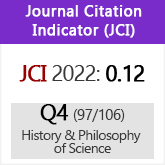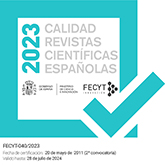Science and Being: Paradox and Irony at the Goethean Prometheus
DOI:
https://doi.org/10.3989/asclepio.2013.02Keywords:
Ciencia, Hombre, Naturaleza, Ironía, ParadojaAbstract
The point of departure in this paper is the study of Prometheus’s figure during the European Enlightenment, in order to understand its insertion in the German context of the Sturm und Drang. The emphasis lays in Goethe’s Prometheus and the relation that this poem exposes between Knowledge, Nature, and Self-realization. Here, Prometheus represents the enlightened man who, through science, search the mediums to surpass his natural conditions and break all kind of chains (political, moral or religious chains), but the problem is that his intention is always interfered by «irrational forces». ¿What man can learn about himself in this conditions of «irony» and «paradox» expressed in the Prometheus? That is the question that we expect to response here.
Downloads
References
Bergstrasser, Arnold (1949), "Goethe's View of Christ", Modern Philology, 46 (3), pp. 172-202, p. 177, p. 187, p. 193-195.
Bishop, Paul (1999), "Introduction". En: Bishop, Paul (ed.), Jung in Context. A Reader, pp. 1-23, Londres, Routledge, p. 2.
Bishop, Paul (2008a), "Jung's early reception of Goethe and Faust, 1880-1916". En: Bishop, Paul (ed.), Analytical Psychology and German Classical Aesthetics. Goethe, Schiller, and Jung. Vol. 1, East Sussex, Routledge, pp. 42-80, p. 62.
Bishop, Paul (2008b), "Thinker: Carl Jung", New Humanist, 123 (1), enero/febrero, p.29.
Brown, Robert H. (1992), "The 'Demonic' Earthquake: Goethe's Myth of the Lisbon Earthquake and Fear of Modern Change", German Studies Review, 15 (3), pp. 475-491, pp. 476-477, p.483, p. 387.
Bürger, Gottfried A. (1835), Sämmtliche Werke, Gotinga, Dietrich, p. 63.
Colomer, Eusebi (2001), El pensamiento alemán de Kant a Heidegger. II, España, Herder, pp. 21-22.
Deschepper, Jean-Pierre (1992), "El Spinozismo". En: Belaval, Yvon (dir.), Racionalismo, Empirismo, Ilustración, pp. 130-157, Madrid, Siglo XXI de España Editores, S.A, pp. 151 y ss.
Durand, Gilbert (1993), De la mitocrítica al mitoanálisis. Figuras míticas y aspectos de la obra, Barcelona, Anthropos, p. 33.
Ehrlich, Godfried (1944), "Goethe, Freiheit und Sturm-und-Drang", Pmla, 59 (3), pp. 792-812, p. 792.
Friedenthal, Richard (1963), Goethe: his Life and Times, Londres, Weidenfeld & Nicolson, pp. 31 y ss.
García Bacca, Juan David (2001), Sobre filantropía. Tres ejercicios literario-filosóficos, Barcelona, Anthropos, pp. 28-29, p. 30, p. 46.
Garcia Gual, Carlos (1995), Prometeo, mito y tragedia, Madrid, Hiperión, p. 147, pp. 191-192.
Gerth, Hans H. y Wright Mills, Charles (1946), From Max Weber: Essays in Sociology, Nueva York, Oxford University Press, p. 50.
Goethe, Johann W. (1999), "Prometeo". En: Goethe, Johann W. (ed.), La vida es buena (cien poemas), Madrid, Visor, pp. 25-27.
Gómez de la Serna, Ramón (1996), Obras completas I, Barcelona, Galaxia Gutenberg-Círculo de Lectores, 101.
Gray, Ronald D. (1952), Goethe The Alchemist. A Study of Alchemical Symbolism In Goethe's Literary And Scientific Works, Londres, Cambridge University Press, p. 15. PMid:14946421
Hanratty, Gerald (1986), "Hegel and the Gnostic Tradition: II", Philosophical Studies, 31 (87), pp. 301-325, p. 308.
Jølle, Jonas (2004), "Prince poli & savant: Goehte's Prometheus and the Enlightenment", The Modern Language Review, 99 (2), pp. 394-415, p. 395, pp. 398-399, p. 400, p. 401, p. 402.
Kerényi, Carl (1997), Prometheus. Archetypal Image of Human Existence, Nueva Jersey, Princeton University Press, p. 15.
Koselleck, Reinhart (1985), "Neuzeit': Remarks on the Semantics of the Modem Concept of Movement". En: Koselleck, Reinhart, Futures Past: on the Semantics of Historical Time, Cambridge, The MIT Press, pp. 238-258, pp. 238-239.
Leidner, Alan C. (1989), "A Titan in Extenuating Circumstances: Sturm und Drang and the Kraftmensch", Pmla, 104 (2), pp. 178-189. http://dx.doi.org/10.2307/462503
Lutzeler, Paul Michel (2000), "Goethe and Europe", South Atlantic Review, 65 (2), pp. 95-113, p. 104.
Magee, Glenn Alexander (2001), Hegel and the Hermetic Tradition, Ithaca, Cornell University Press, p. 53, p. 21.
Mason, Stephen F. (2001), Historia de la ciencias. 3, Madrid, Alianza Editorial, pp. 113-114.
Michaelis, Loralea (1999), "The Wisdom of Prometheus: Kant, Marx, and Hölderlin on Politics, Disappointment, and the Limits of Modernity", Polity, 31 (4), pp. 537-559, p. 540, p. 542, pp. 550-551.
Middleton, Christopher (ed.), (1994), Goethe. The Collected Works. Selected Poems, EE.UU., Princeton University Press.
Nietzsche, Friedrich (1999), El viajero y su sombra. Segunda parte de 'Humano demasiado humano', Madrid, Edaf, p. 181.
Spinoza, Baruch (1677), "Ethica. Ordine geometrico Demonstrata et in quinque partes distincta". En: Spinoza, Baruch, Opera Posthuma, [en línea], disponible en: http://www.thelatinlibrary.com/spinoza.html, [consultado el 20/04/2011].
Warde, Anton (1975), "Goethe, Schiller, Faust, and the Ideal: The Genesis of Irony in Faust", The German Quarterly, 48 (2), pp. 175-186, p. 176, p. 177, p. 180, p. 182.
Webster, Charles (1988), De Paracelso a Newton: la magia en la creación de la ciencia moderna, México, Fondo de Cultura Económica, p. 77, p. 100. PMid:3365482
West, Martin L. (1990), "The Authorship of the Prometheus Trilogy". En: Studies in Aeschyus, Sturrgart, Teubner, pp. 51-72.
Yates, Frances A. (1982), La filosofía oculta en la época isabelina, México, Fondo de Cultura Económica, p. 90 y ss, p. 285.
Published
How to Cite
Issue
Section
License
Copyright (c) 2013 Consejo Superior de Investigaciones Científicas (CSIC)

This work is licensed under a Creative Commons Attribution 4.0 International License.
© CSIC. Manuscripts published in both the printed and online versions of this Journal are the property of Consejo Superior de Investigaciones Científicas, and quoting this source is a requirement for any partial or full reproduction.All contents of this electronic edition, except where otherwise noted, are distributed under a “Creative Commons Attribution 4.0 International” (CC BY 4.0) License. You may read here the basic information and the legal text of the license. The indication of the CC BY 4.0 License must be expressly stated in this way when necessary.
Self-archiving in repositories, personal webpages or similar, of any version other than the published by the Editor, is not allowed.















